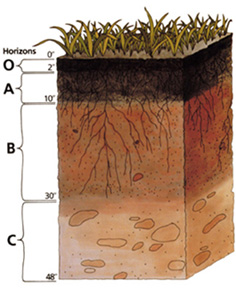Soil Amendments & Mulch
Do you have healthy soil?
By improving your soil conditions the soil will retain the right amount of water helping your plants thrive. And you’ll be conserving water too. As typical to the Northwest is rain, is clay in our soil. Because our soils are predominately clay, with some sandy soils, so improvements to the soil are also very important to water-wise landscaping. Clay soils absorb water so slowly that if water is applied too quickly it runs off the surface before it can infiltrate the soil. Sandy soils have such large air spaces that they dry quickly and do not hold water or nutrients well. By adding organic soil amendments such as compost or peat moss it improves absorption, water holding capabilities, and may provide nutrients for plants. Amendments like compost also have beneficial microorganisms and fungi, enriching the soil. By developing healthier soil you will have less water run-off and puddling. Work generous amounts of soil amendments into the soil as deep as possible before planting. Your plants will love it!

Simple test to determine soil type:
Take a handful of moist soil and squeeze it. When you open your hand, a good loam soil will remain a pliable ball that breaks apart with a touch of your finger. Good loam will have a gritty feeling and is usually dark in color.
A fine clay soil will remain in a doughy, slippery ball when you open your hand. It feels smooth to the touch and sticky to the touch when wet. Clay soil after rainfall or watering, the surface may back into a hard crust that prevents water and air from reaching plant roots. Clay is the most difficult soil type to manage, but with the addition of sufficient sand and organic amendments, it can be turned into loam.
A moist handful of sandy soil will form a shape when squeezed by barely holds together.
Don’t forget to use mulch around your plants. This helps reduce water evaporation keeping water in the soil. Organic mulches included aged manure, compost, and bark chips, or wood chips. Organic mulches increase the soils ability to store water by covering and cooling the soil thereby minimizing evaporation. Mulches also reduce erosion and help with weed control. Inorganic mulches such ass rocks and gravel will actually re-radiate the sun’s heat and can increase the amount of water that surrounding plants will need.
Smart Soil Care Tips
- Top your soil. Adding compost or mulch to your soil helps hold water in and minimize evaporation by keeping the soil covered and cooled.
- The sponge effect. Compost and mulch also hold water like a sponge, slowly releasing water when your plants need it.
- Stop that runaway terrain! Healthy soils also slow down the erosion of sediments to rivers and streams.
- Go au natural. Avoid pesticides and weed killers since they can harm worms and other soil organisms that create healthy soils. Choose natural or organic alternatives.
![]()
Conservation Rebates
![]()
Conservation Tools
![]()
Indoor Conservation
![]()
Outdoor Conservation
![]()
